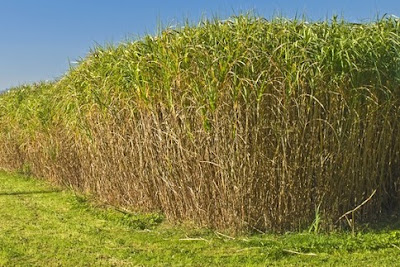Miscanthus, better known as elephant grass, is already being used in Europe to produce biofuel to
replace coal in power stations − but growing enough of it is the main drawback.
By adapting a tropical grass to grow in the British climate, scientists hope to be able to replace coal in power stations with biofuel.
The UK government is spending £1.8 million on a scientific project that aims to breed a new seed-producing variety of tropical grass that could provide aviable source of fuel for power stations.
Miscanthus, better known as elephant grass, is already being used in Europe to produce biofuel to replace coal in power stations − but growing enough of it is the main drawback.
So scientists at Aberystwyth University in Wales are being given government funding to help develop miscanthus strains that like UK conditions and produce viable seeds, without losing the fast-growing and drying properties that make it ideal for biofuel.
The variety currently used is Miscanthus x Giganteus, which grows fast – up to three metres tall − on poor agricultural land in Europe to produce a cash crop for farmers in the spring, when the dried stalks from the previous year are ideal for burning in power stations.
Hybrid variety
However, the “giganteus” is a hybrid variety that does not produce viable seeds. To grow a new plant, farmers currently have to break off and sow a bit of the root, or rhizome, of another elephant grass.
“The overall goal is to develop new systems for miscanthus-based agriculture that increase profitability, and so enable transition of today’s niche crop into a large-scale biomass supply system.
Dr John Clifford Brown, leader of the project at Aberystwyth University’s Institute of Biological, Environmental and Rural Sciences
Even with machines to plant dozens of chopped-up rhizomes, it is very time-consuming to plant enough elephant grass to feed a power station, or to make bio-fuel for cars. If the grass produced seed, areas could be planted 200 times faster.
Currently, the UK demand for biomass for electricity is more than 5 million tonnes a year, of which 75 per cent is imported − which partly defeats the object, since transporting biomass uses fossil fuels.
The theory is that all of these imports could be replaced by elephant grass if UK farmers were given the means to plant enough.
In addition, smaller local biomass plants could be built near where the elephant grass grows, thus cutting transport costs. And any surplus could be used to produce liquid fuel to power lorries and cars.
According to enthusiasts, if a car engine used a gallon of fuel every 25 miles, one tonne of miscanthus could produce biofuel to drive over 750 miles.
Once the grass has been planted, it lives for 20 years and produces 10-20 tonnes of fuel per hectare. It is also said to be beneficial for birds and wildlife that live protected inside the almost impenetrable foliage and in the leaf litter between the rows.
In some parts of the world, miscanthus varieties that do produce seeds can be a problem as they can block watercourses and are hard to remove once their roots have become established.
However, the scientists at Aberystwyth University’s Institute of Biological, Environmental and Rural Sciences are confident that they can produce a plant that reproduces and grows well in European conditions, while avoiding any environmental problems with careful management.
Reduce emissions
Dr John Clifford Brown, leader of the project, believes that the crop will benefit the agricultural industry and reduce the UK’s carbon emissions.
He revealed that the university has already spent 10 years working on developing miscanthus into a crop that can supply the UK’s growing biomass demand, and that the seeds of the new hybrids will be planted at four trial sites across the UK to see which performs best.
“Several harvesting approaches will be explored to maximise crop quality and quantity,” he said. “The overall goal is to develop new systems for miscanthus-based agriculture that increase profitability, and so enable transition of today’s niche crop into a large-scale biomass supply system.
“The UK needs to reduce CO2 emissions in order to mitigate climate change, and we also need to develop our economy to take advantage of green technologies, as opposed to relying on a limited stock of fossil fuels.”

Energy crisis a very hot debate all over the world and the students are specially given lectures on essay editing service uk the topic and they are advised to study needs of country and find the solution of energy crisis for their country.
ReplyDeleteMiscanthus, better known as elephant grass, is already being used in Europe to produce biofuel to replace coal in power stations − but growing enough of it is the main drawback. best cotton bed sheets online , bridal bed sheet with price
ReplyDelete